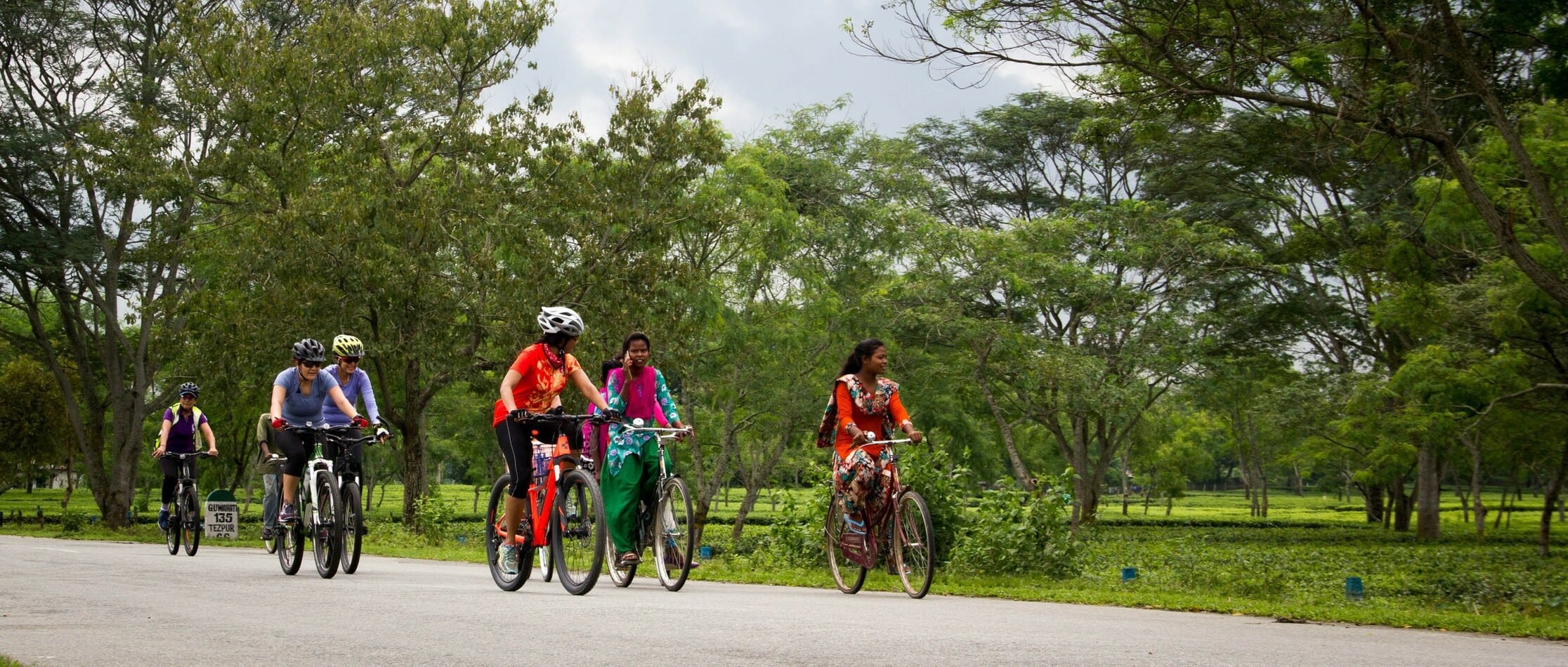And how to apply it?
The 2020 pandemic has been quite a challenge for tourism. In addition to the new sanitary measures that are and will have to be put in place by the authorities, hotels and touristic sites, many actors will have to rethink how they operate and how they travel. In order to make the journey more authentic: to meet new cultures, to discover the natural wonders and to exchange with the locals.
During the confinement, many places with high tourist traffic like Venice found themselves empty overnight from one extreme to another. Deeply affected by the Covid-19 coronavirus epidemic, the population and the mayor of the city want to move from mass tourism to a softer economy (France TV info), even if it means accepting a maximum quota of daily visitors. And this is just one example.
Why is mass tourism harmful?
From an environmental point of view, mass tourism leads to over-consumption of natural resources and more waste to manage. For example, the consumption of fresh water by large resorts continues to grow dangerously. In addition to the waste to be treated, pollution is of many natures: greenhouse gas emissions, air pollution, water pollution… nature suffers from our actions, sometimes thoughtless.
From a social point of view, it imposes the construction of large infrastructures (roads, hotels, etc.), which encourages rural exodus, and the abandonment by local populations of entire regions in favor of tourist centers.
Sustainable tourism cannot be a new catchy word, it must be the DNA of civilized society. It should be the norm and not the travel option. Travel less, travel better, travel longer
Over the past decade, different concepts have emerged that are part of Responsible Tourism. Some travel agencies have followed this movement for purely marketing and economic purposes. Others, on the contrary, have launched responsible circuits in a real spirit of sustainable development and openness. To make a difference.
Responsible travel, ecotourism, fair tourism, solidarity, ethics, sustainable… difficult sometimes for travelers to understand. Here are some definitions and examples to get a clearer picture:
Sustainable Tourism
Sustainable tourism includes all forms of alternative tourism – this is an alternative to mass tourism. Ecotourism, for example, is one of its sub-categories.
It is a philosophy close to the fundamentals of sustainable development that is applied to tourism. A term more used by institutions or travel agencies, sustainable tourism differs from responsible tourism because it is a code of conduct and not a behavior. Sustainable tourism is a broad concept that brings together several tourism practices that respect the environment and local communities.
Responsible Tourism
Often presented as a synonym for sustainable tourism, responsible tourism has certain characteristics.
Responsible tourism is based on several fundamentals:
- To have a positive impact on local people while having a minimal impact on the environment
- Preservation of the nature, respect for the people we meet, listening, sharing …
Far from mass tourism and consumer circuits, these values are described as sustainable, ethical, equitable, and participatory.
Ecotourism
As a catch-all term, ecotourism is a tourism initiative committed to sustainable development aimed at preserving the biodiversity and cultural resources of a natural area. Raising awareness of the social and environmental issues of all stakeholders is paramount. For example, hiking in a national park, accompanied by a local guide, is ecotourism because it generates significant income for host communities.
Our guided tours and a la carte trips keep as a reference to the preservation and respect of the environment and local communities.
Aware of the impact of air travel, we encourage all travelers to offset their carbon emissions. Calculate your carbon footprint on Goodplanet.org.
One idea may be to cushion its carbon impact while supporting local conservation efforts. In order to plant trees in Arunachal Pradesh for example, you can contact:
Agritourism or Farm Stay
It is a form of tourism aimed at discovering and sharing the know-how of an agricultural environment. It is practiced in several ways: visiting the farm, permaculture workshops, accommodation, catering and sales of agri-food products. C’est aussi une occasion unique pour les agriculteurs de transmettre leurs savoirs et leurs expériences avec le voyageur, associée à une volonté de s’éloigner des circuits touristiques traditionnels.
Slow Tourism
Little brother of the Slow Food movement, it is a matter of discovering enchanting landscapes while taking your time, fully soaking up the nature that surrounds us, favoring encounters, and savoring the pleasures of the table. These principles have gained popularity with travelers in recent years and the travel offered in connection with this type of tourism is on the rise. Proof of this is that taking your time on holiday has never been so topical.
Equitable Tourism
Little brother of fair trade, it is a professional ethic that allows local communities to fully benefit from tourism. Intermediaries are kept to a minimum for fairer pay and improved living conditions.
Community Tourism
It is a form of tourism by the people for the people. It implies that a significant number of people living in a territory have substantial control over their own management and tourism development. Thus, members of the community, as well as those not directly involved in the tourism industry, should also benefit from the economic benefits. It is designed so that local people can take charge of tourism development projects. In addition to being extremely useful for the growth of certain regions, community tourism leads to the development of host communities and their self-management.
Humanitarian tourism or Voluntourism
Voluntourism, also known as “humanitarian tourism,” promises individuals who want to commit to a cause, discovering new cultures and countries while “humanitarianizing” without being professionals in the sector. Even if the initial intentions seem laudable, in fact the excesses are numerous and some actors do not hesitate to exploit the “humanitarian business” to satisfy their customers at the expense of the local populations.
Participatory Tourism
Participatory tourism encourages the building of relationships between host populations and tourists. The aim is to create a true alchemy between the two “visible” sides of tourism, visitors and guests. It’s a way of reinventing the sense of hospitality. This type of tourism can be practiced absolutely everywhere: rural, urban or even on the coasts, the important thing is to involve the local people in the tourism development of their region.
Solidarity Tourism
Every year, millions of tourists travel around the world in search of places, encounters that are always more unusual and different than the others. This has resulted in the current tourist landscape, the creation of several types of alternative tourism. Responsible tourism, fair tourism, but also solidarity tourism. Supporting local development projects, respecting the host populations, these are the main rules to respect during a trip in the form of solidarity tourism. Of course, there are many other things.
What does Eastern Routes do to promote responsible tourism?
Eastern Routes offers a different vision of travel. Indeed, traveling the world has become a harmful and polluting consumer product, its vision of travel is then as such: in a small group, more human, more open to the other, less consumption, and more respectful of the Earth. Since our inception, we have been committed to a sustainable approach by conviction and for the intrinsic values it encourages.
Discover the principles of our travel philosophy.
We only offer tailor-made tours and stays based on responsible tourism. Our travels will take you through the incredible ecosystem of northeastern India. You will also have the opportunity to meet the local people, especially craftsmen who will be keen to share their know-how.
Through our travels, we encourage the work of local companies with socio-environmental principles. Because we have always had the will to highlight the men and women who contribute to the sustainable and ecological development of their environment. They are the soul of a territory, the ambassadors of its wealth, the guardians of traditions. We want more than anything to highlight those people who work every day, on their scale, to save the Earth. Your hosts will be producers, eager to pass on their passion and know-how to you.
Heroes of Northeast India : Seemingly ordinary people who dedicate their life to preserve ecosystems and cultural heritage
Eastern Routes Blog
We are also very sensitive to the concept of Slow Tourism, because we have experienced it and know that it is the best way to experience a real immersion. Because the trip must be a moment of discovery while remaining attuned to one’s neighbor, we offer in some of our tours, a slow tourism approach.
Traveling with Eastern Routes means ensuring job creation and equitable income redistribution, economic diversification, protection, and enhancement of craft heritage and traditions.
We can also refer you for FREE, and very willingly, to the various NGOs in North-East India that really contribute to the development of societies and individuals. Do not hesitate to contact us.
To go further:
How can we be sustainable post-covid 19 ? (BBC)
“Sustainability as the New Normal” a Vision for the Future of Tourism (UNWTO)
Gearing up for sustainable tourism in a post-Covid world (Times of India)



